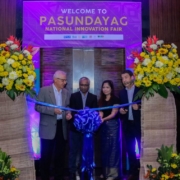TUKLAS INNOVATORS CONVERGE IN PASUNDAYAG NATIONAL FAIR
The Pasundayag National Innovation Fair was held last March 29, 2019 at Crowne Plaza Manila Galleria, Pasig City in celebration of the different innovations on disaster resiliency that were crafted and honed for the entire year under the Tuklas project. This marks as the culminating event for the project as several Pasundayag Fairs were held across Luzon, Visayas, and Mindanao.
Dennis O’Brien of Plan International Philippines, Kei Valmoria of the Citizens’ Disaster Response Center (CDRC), Suresanathan Murugesu of Action Against Hunger, and Tim Bishop of CARE USA formally opened the national fair through a ribbon-cutting ceremony. The event was graced by the presence of various innovators, agencies, non-government organizations, investors, and both local and international stakeholders and supporters.
In his closing remarks, Deputy Country Director of Action Against Hunger Philippines Mission, Mr. Suresanathan Murugesu, left the participating innovators an inspiring reminder to keep working hard and continuously improve disaster preparedness strategies through their crafts. “Help us bring these ideas to the communities for replication,” said Mr. Murugesu.
Action Against Hunger, together with Plan International, CARE Philippines, and Citizens’ Disaster Response Center put great efforts and focus on implementing the Mindanao Lab. The Tuklas Innovation Labs was supported by UK Aid, Start Network, and CDAC Network. ●



